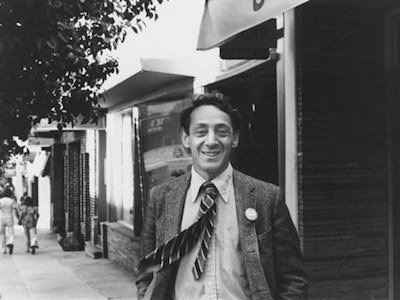|
Reviews of Recent Independent, Foreign, & Documentary Films in Theaters and DVD/Home Video

THE TIMES OF HARVEY MILK In a postscript included on Criterion’s reissue of the 1984 documentary The Times of Harvey Milk, political consultant Tory Hartman reflects on the activist’s legacy. “Does man make history or does history make the man?” she asks rhetorically. Indeed, history seems to have made Harvey Milk as much as the converse. He didn’t become active in politics until his forties, when he moved to San Francisco’s queer-friendly Castro district during a time of social upheaval. But once he made a name for himself, becoming the first openly gay man to hold public office in California, he not only realized his political destiny but his inevitable martyrdom. One of the film’s most intimate details is a recording of Milk’s audio will, which he instructed to be played only in the event of his assassination. Milk was murdered in 1978 by colleague Dan White, who served with him on the city’s board of supervisors. White was a staunch conservative and the only board member to cast a dissenting vote against Milk’s ordinance protecting homosexuals in the workplace. While his exact motive is never made clear, there is no question that politics played a part. Citing personal stress and discomfort, White had resigned from his post but quickly recanted. He then shot and killed popular progressive mayor George Moscone, who had refused to reinstate him, and Milk, who had lobbied hard against his reappointment. The film puts more focus on Milk’s career and accomplishments than his tragic demise, though his murder is revealed right at the beginning, casting a pall over the mostly celebratory biographical sketch that follows. Director Robert Epstein makes no pretense of objectivity, nor does he mine for any deeply personal information. Most of Milk’s close friends, including longtime love Scott Smith, are not interviewed in the film. These choices are deliberate; in the audio commentary track, Epstein explains he wanted to focus not on Milk’s life but his “times.” The effect may be one of slight dramatic inertia, but it at once allows for a more universal story and a fuller picture of the era, shifting the focus to the burgeoning gay rights movement and its powerful opposition. DVD supplements are made for documentaries like this, as so much is often left out when trying to fashion reality into a digestible narrative. That said, the only truly illuminating feature on this double disc is a 2003 panel discussion with Dan White’s attorneys, which attempts to shed light on the notorious “Twinkie defense” used to knock White’s murder charge down to voluntary manslaughter. (He had only served five years in prison for his crimes, which many in the film saw as a referendum on homosexuality in general and Milk in particular.) White’s lawyers, Douglas Schmidt and Stephen Scherr, defend their case here, maintaining that the murder was not committed in cold blood but “in the heat of passion by a person who was aroused to an angry emotional state.” “I would hazard to say that the
slaying of Harvey Milk had nothing to do with his sexual orientation,”
Schmidt continues. “That falls on deaf ears much of the time, but it’s
my opinion.” That may very well be true, especially since, as the film
shows, Milk was so much more than a gay activist; he was an advocate for
human rights and a champion of the disenfranchised everywhere. But, as
film professor Jon Else says in another featurette, White may have
feared what he felt Milk had come to represent: a visible subculture of
unfettered homoerotic expression. “There’s plenty of footage of pretty
extraordinary gay eroticism (from that time and place),” Else says. “And
that’s not in the movie…Would it have driven away an audience that
really needed to see this film? Maybe. It was probably wise to stay away
from that stuff.” It would have also been unfair to tar Milk with such a
brush. In spite of—or because of—his untimely demise, he was responsible
for not only leading a generation of gay Americans out of the closet but
out of the bathhouse and into the voting booth.
Brian Theobald
|

